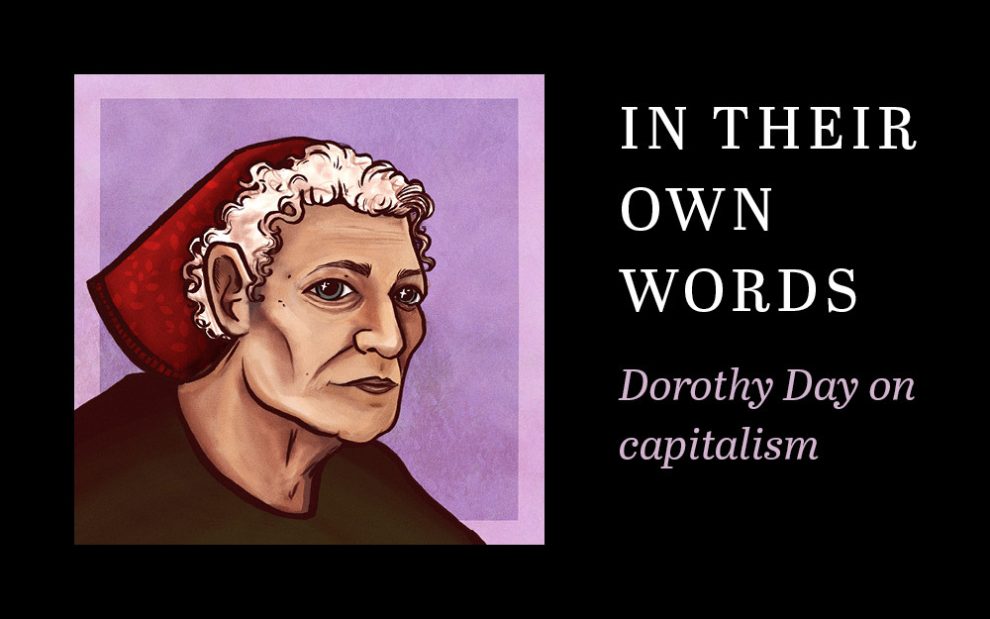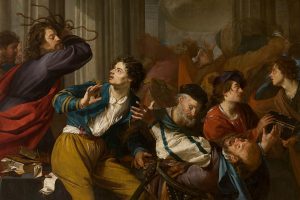In Their Own Words is a new web column from U.S. Catholic. In these essays, academics and other experts provide short, evidence-based explanations of prominent Catholic figures’ views on an array of topics of interest to the church and offer resources for finding further accurate information.
Many Americans have been taught that the only economic options are capitalism (“free markets”) or autocratic societies (“communism”). Though this consensus became culturally entrenched during the Cold War, many Catholic thinkers during the 19th and 20th centuries, including Dorothy Day, had a different perspective.
Day, from an early age, burned with love for her fellow human beings—especially those suffering injustice. Born in Brooklyn in 1897, Day moved back to New York City at age 18, after having lived in San Francisco and Chicago and studying for two years at the University of Illinois. In December 1927, Day was baptized a Catholic. Five years after her conversion, Day met Peter Maurin, who introduced her to the Catholic encyclicals that called for the reconstruction of the social order. In 1933, Day wrote the first editorial for their new newspaper, The Catholic Worker. In it,Day wrote she was printing this paper to bring “attention to the fact that the Catholic Church has a social program—to let them know that there are men of God who are working not only for their spiritual, but for their material welfare.”
Throughout the half-century she ran The Catholic Worker, Day made a strong critique of capitalism. “There are two billion people in the world, and if we believed all we read in the paper everyone must line up on the side of Communism or Americanism, Catholicism, Capitalism, which the most Catholic newspapers would have us believe are synonymous,” Day wrote in December 1950.
Capitalism is the ownership of property by a few, with the majority of the profits from labor going to the owners, and a small amount siphoned off for the workers’ wages. In 1850, Louis Blanc, a socialist French philosopher, defined capitalism as the “appropriation of capital by some, to the exclusion of others.” Unfettered capital, according to critics, overreaches for profit at the expense of all else. And today, the global system of financialized capitalism, rather than the production of goods for everyday life, dominates economic activities.
In a January 1938 editorial on tensions between the mayor of Jersey City and the Congress of Industrial Organizations (CIO), Day and the editors called the mayor “part of a grasping, vicious, thieving system of capitalism. He knows no better; can think in no other channels but those of the tool of vested interests.” More than a decade later, Day continued her critique, particularly noting that most of the natural resources and land in the United States were held by a relatively small number of men.
“The whole history of capital in this country is the story of the trickery and connivary by which the smart few got possession of our national resources, the railroads, the forests, the mines, and so on, down through gas and oil, in many cases ousting the legal of the land wherein these resources were found,” Day wrote in 1950.
One of Day’s most blistering condemnations of capitalism is contained in her column “On Pilgrimage,” from September 1956. She begins by meditating on a visit to a prisoner in Philadelphia condemned to die. “Where does cruelty begin and end?” Day asks, in this raw meditation on city life.
“So much money is spent on buildings and so little on people, on social workers, on attendants, on doctors. Even the resident doctors get little or nothing for their services. The laborer is worthy of his hire. People always fall back on the phrase, ‘it is the system.’ We need to change the system,” Day wrote. “We need to overthrow, not the government…but this rotten, decadent, putrid industrial capitalist system which breeds such suffering in the whited sepulcher of New York.”
In another article for The Catholic Worker, Day quoted the Vatican newspaper, L’Osservatore Romano, on capitalism: “Capitalism seizes, confiscates, and dries up wealth, i.e. reduces the numbers of those who may enjoy riches, holds up distribution and defies Divine Providence who has given good things for the use of all men,” she wrote. Day’s critique focused on her belief that capitalism did not account for the human person as spirit as well as body. “Capitalism is intrinsically atheistic,” she continued, quoting the Vatican author who condemned capitalism as promoting unchecked avarice.
Day believed that the conditions of capitalism—of greed, of turning necessities like clothing, food, and housing into investment commodities for the rich—were preventable. “We are very much dedicated to overthrowing the kind of society we have to live in,” Day said in a 1970 interview with the National Catholic Reporter.
Day’s critiques reflect the official teaching of the Catholic Church. From encyclicals like Leo XII’s Rerum Novarum (On Capital and Labor) in 1891 to the United States Conference of Catholic Bishops’ pastoral letter “Economic Justice for All” nine decades later, church teaching continues to emphasize the importance of creating an economic system ruled not by the logic of maximizing profits but by respect for human dignity and the common good.
Day did not just want to protest the way things were: the Catholic Worker movement had a long-term vision for the reconstruction of the social order, “to take the place of both capitalism and communism,” Day wrote in 1953. Here, too, her view aligns with traditional Catholic teaching. According to the catechism, the church “has rejected the totalitarian and atheistic ideologies associated in modem times with ‘communism’ or ‘socialism.’ She has likewise refused to accept, in the practice of ‘capitalism,’ individualism and the absolute primacy of the law of the marketplace over human labor . . . Reasonable regulation of the marketplace and economic initiatives, in keeping with a just hierarchy of values and a view to the common good, is to be commended.”
Day imagined an economic reality that honored the dignity of the human person, based on the universal brotherhood of the mystical body of Christ. This reality was incarnated through economic cooperation, rather than in competition.
“This teaching, the doctrine of the Mystical Body of Christ, involves today the issue of unions (where men call each other brothers); it involves the racial question; it involves cooperatives, credit unions, crafts; it involves Houses of Hospitality and Farming Communes,” Day wrote in February 1940. “It is with all these means that we can live as though we believed indeed that we are all members one of another.”
This essay is the first in a new column, In Their Own Words, which aims to accurately represent the views of different notable Catholic thinkers on an array of topics.














Add comment